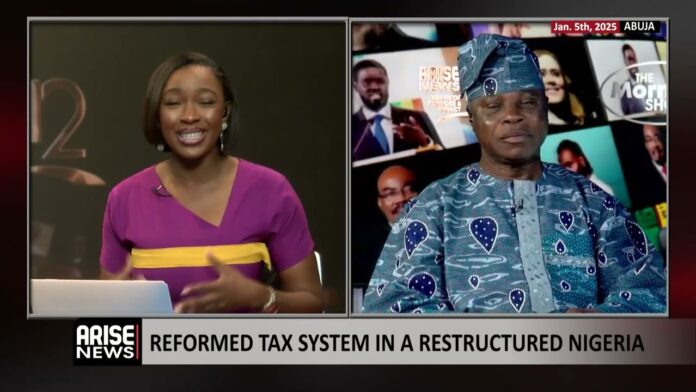In a scathing critique of Nigeria’s existing federal system, Dr. Akin Fapohunda, the Secretary of the Eminent Elders Forum, has declared that the time has come for the South to stand up to the North. He claims that the federal policies favoring the North—particularly the federal character and quota systems—have drained the South’s resources and energy for far too long, benefiting only a small Northern elite while the South bears the brunt.
Fapohunda’s remarks, made during a recent interview with ARISE NEWS, targeted the opposition of Northern leaders to President Bola Ahmed Tinubu’s proposed tax reform bills. These bills have been a point of contention between the North and South, with many Northern politicians claiming they would disadvantage their region.
“They’ve taken us for a ride for too long,” Fapohunda said, expressing frustration at what he perceives as the North’s continued grip on the country’s resources and political structures. “They’ve forced federal character and the quota system on Nigeria for over 40 years. But what have they done with it? Only a tiny clique in the North is holding the whole country hostage.”
Fapohunda’s comments reflect his belief that these longstanding policies have failed to unite the country. He insists that rather than fostering equality, the policies have entrenched divisions, exacerbating the South’s struggle while benefiting a select few in the North.
“The North has damaged Nigeria fundamentally with this attitude,” Fapohunda added, criticizing the Northern elite for their insatiable demands. He pointed out that, while the South has heavily invested in education since the 1950s and 1960s, many of its educated professionals are now being driven abroad in search of better opportunities.
He continued: “Who are the Nigerians who are ‘japaing’ now? It’s Southerners. The products of the South’s educational system are being pushed out of the country. Can you find a Fulani man in London or New York practicing medicine or engineering? It’s the Yoruba, the Igbos, and other Southerners who are marginalized.”
In Fapohunda’s view, the South’s continued sacrifice for the sake of national unity, while the North benefits, must end. “We have to be honest with ourselves,” he said. “It’s time to call the bluff of the North. Not because we support what Tinubu is doing, but because we must confront the reality of Nigeria’s division.”
Fapohunda also criticized President Tinubu for focusing too much on his controversial tax reforms when there are more urgent matters at hand. According to Fapohunda, the tax reform bill fails to consider Nigeria’s deep cultural and regional differences, which he believes will render any uniform tax policy ineffective.
“The North has a different perspective on Sharia, the South-West has its own customs, and the East has another approach. So, how can a unitary tax system work in a country where we all have different ways of life? It’s a road to nowhere,” he argued.
He was equally dismissive of the tax reform’s potential to resolve Nigeria’s financial woes, questioning how the government intends to generate enough revenue. Fapohunda raised concerns about the current state of the economy, especially the exodus of companies that can no longer afford basic operational costs due to Nigeria’s ongoing energy crisis.
“Big companies are folding up, they’re leaving Nigeria, and the few remaining ones can’t afford diesel for their generators,” he said. “So who is going to pay the tax? Is it the small, struggling businesses? And what are we going to do with the tax money? Pay back loans we’ve already squandered or fund deficits?”
While he acknowledged that tax reform could be beneficial in the long run, Fapohunda believes that Nigeria’s immediate priorities lie elsewhere. He emphasized that the focus should be on tackling deeper structural issues, such as the state of the civil service, the stalled agricultural reforms, and the unimplemented policies promised by the president.
“The president is too focused on just one issue—tax,” Fapohunda lamented. “He’s staking his entire political capital on it, but there are many other things he needs to address. Civil servants are struggling just to survive; the Orasanye report he promised to implement is gathering dust. The N500 billion agricultural project he announced in 2023 has gone nowhere. Now, there’s a livestock ministry—what has it achieved?”
For Fapohunda, these are the kinds of urgent issues that require the president’s attention, not tax reform. “The country needs reorganization, not just a tax overhaul. We need regional autonomy, not a unitary system that forces us all to be the same when we’re not,” he asserted.
Fapohunda’s call for regionalisation is grounded in his belief that Nigeria’s unity, as currently conceived, is a myth. He believes that as long as the North continues to exert its dominance over the South, true unity is unattainable. Instead, he advocates for the South to break free from this unequal system, with both regions living as good neighbors but each with the freedom to chart their own course.
“The North and South are unequally yoked,” Fapohunda concluded. “We cannot be united until we address this fundamental imbalance. Let everyone live according to their worldview, and the temperature in this country will come down. But trying to force a one-size-fits-all solution from Abuja is simply not going to work.”

